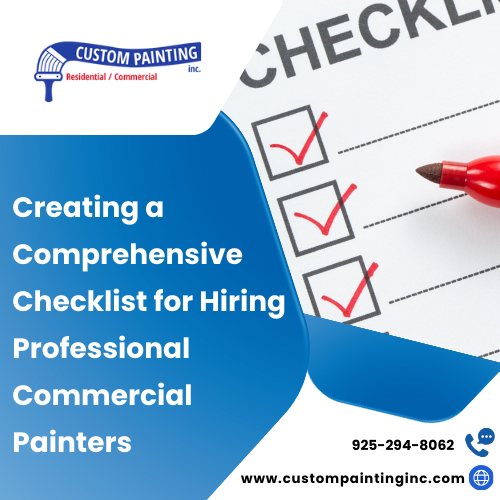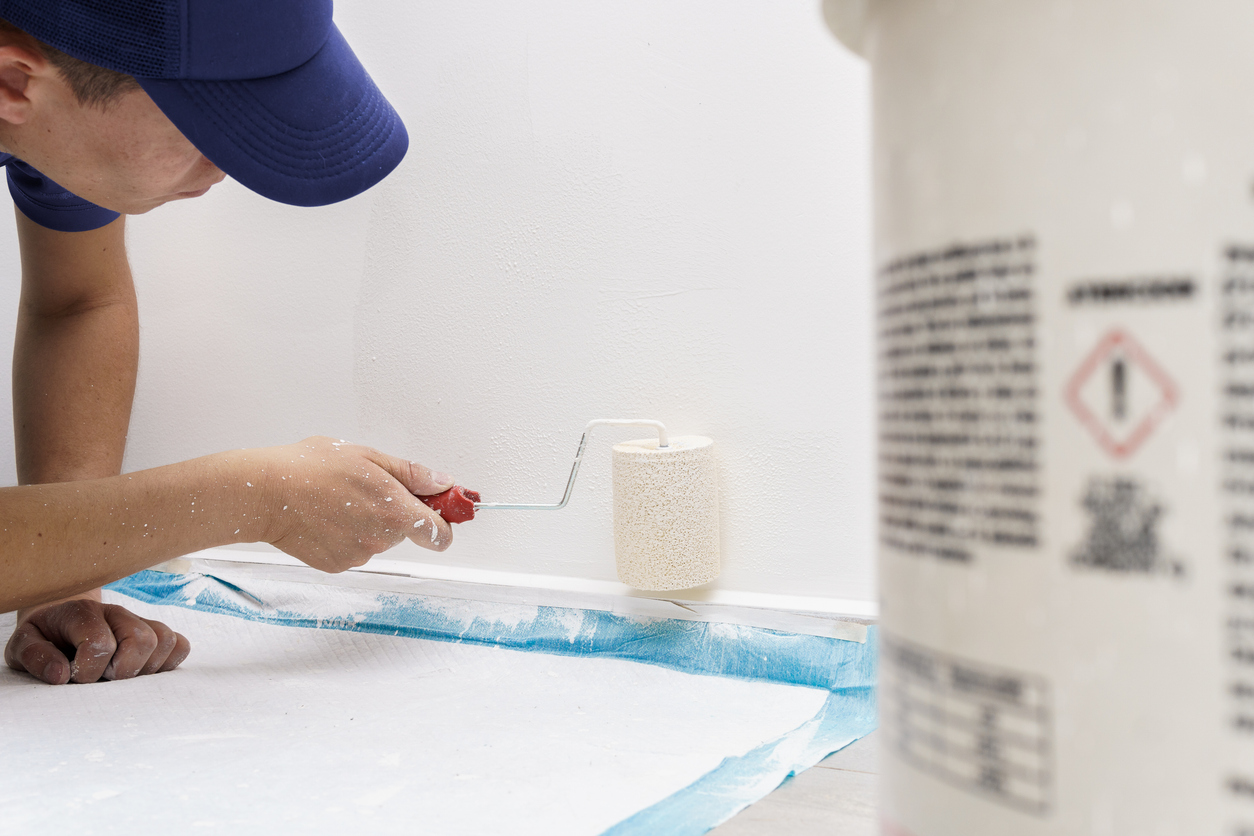When it comes to maintaining a professional appearance and ensuring the longevity of your Concord, CA area commercial property, selecting the right painting contractor is crucial. A fresh coat of paint can revitalize your business’s look and protect its structural integrity. However, the challenge often lies in choosing a professional commercial painter who can deliver quality work within your timeframe and budget.
This article will guide you through creating a comprehensive checklist encompassing all the critical aspects of hiring a commercial painting contractor. From verifying credentials and experience to understanding the importance of detailed contracts and clear communication, we will cover everything you need to ensure your painting project succeeds.
Understanding Your Painting Project Needs
Before reaching out to potential Antioch, CA painting contractors, it’s essential to understand your painting project needs clearly. There might be more tasks than just painting including concrete ceiling repair, rusty door painting and wood rot repair. This foundational step will help you communicate more effectively with contractors and ensure that you receive accurate and comprehensive bids.
Identifying the Scope of Your Painting Project
Start by determining whether your project involves interior, exterior, or both types of painting. This decision impacts the choice of materials, the complexity of the job, and the necessary preparation work. For interior projects, consider factors such as ventilation and the use of the space during the project to minimize disruption.
Consider the climate and environmental conditions the paint will need to withstand for exterior jobs. If interior and exterior surfaces need work, note that these may require different skill sets and materials, potentially influencing your choice of contractor.
Assessing Special Requirements
Every commercial space in Benicia, CA and surrounding areas has unique characteristics and may require specific painting solutions:
- Custom Colors: If brand consistency or aesthetic appeal is critical, you may need custom colors that align with your corporate identity or interior design scheme. Ensure that the painters can match or create the exact shades you require.
- High Durability Paints: In environments subject to heavy wear, harsh weather, or specific hygiene requirements (such as kitchens or hospitals), high-durability paints or special finishes might be necessary. These products can resist fading, mold, and mildew or are easier to clean and maintain.
By thoroughly understanding and outlining your needs, you can ensure that the contractors you consider are well-equipped to handle the specific demands of your painting project. This clarity will also aid in comparing bids and capabilities more effectively, leading to a better overall outcome for your commercial property.
Initial Research and Gathering Recommendations
Choosing the right commercial painter for your project begins with diligent initial research and leveraging recommendations from trusted sources. This approach helps identify reputable professionals with a proven track record of delivering quality work.
Where to Look for Reputable Commercial Painters
Finding a skilled and reliable commercial painting contractor can be approached through various channels:
- Trade Associations: Organizations such as the Painting Contractors Association (PCA) provide directories of certified members who adhere to professional standards and ethics. Membership in such associations often signifies a commitment to quality and reliability.
- Online Platforms: Websites like Angie’s List, HomeAdvisor, and the Better Business Bureau are valuable resources for finding painters with strong customer ratings and reviews. These platforms often include detailed feedback about contractors’ reliability, adherence to budgets, and quality of work.
- Local Businesses: Visiting or contacting businesses similar to yours that have recently undergone painting projects can be a practical approach. They can provide insights into the painters they used and their satisfaction with the services provided.
Importance of Gathering Recommendations from Other Businesses
Recommendations from other businesses are invaluable because they understand the specific challenges and needs typical to commercial painting projects. Businesses similar to yours can offer the following:
- Real-life Experiences: They can share first-hand experiences regarding the painters’ professionalism, ability to meet deadlines, and the durability of the work done.
- Relevance: Recommendations from businesses in similar sectors or with similar property types can provide relevant examples of the painter’s expertise and ability to handle projects like yours.
- Potential Pitfalls: Learning about any challenges or issues other businesses encounter can prepare you to address or avoid these problems in your project.
Collectively, the combination of initial research and gathering personal recommendations form a solid foundation for selecting a commercial painting contractor. This ensures you partner with a service provider who can meet your project’s specific requirements and maintain the standards necessary for a commercial environment.
Creating Your Checklist – Key Components
When hiring commercial painters in the Lafayette, CA area, having a detailed checklist is essential to ensure all aspects of the project are covered, from verifying credentials to discussing cleanup protocols. Here’s a breakdown of the key components to include in your checklist:
1. Credentials and Legal Requirements
- Licenses: Confirm that the painting contractor is licensed to operate in your area. This is crucial for compliance with local building codes and regulations.
- Insurance: Check that the painter has adequate liability and workers’ compensation insurance to protect against potential accidents or damage.
- Certifications: Inquire about any relevant certifications, such as those for handling hazardous materials like lead paint, which might be necessary depending on the nature of your building.
2. Experience and Portfolio
- Years of Experience: Consider contractors with extensive experience in commercial painting. They are more likely to understand and manage the complexities of large-scale projects.
- Portfolio: Review a portfolio of the contractor’s previous projects, particularly those similar to yours, to assess their capability and craftsmanship.
- References: Request and contact references from past clients to gauge their satisfaction with the contractor’s work.
3. Quotes and Budgeting
- Obtaining Quotes: Gather multiple quotes to compare costs, scope, and services offered. Ensure each contractor has the same detailed requirements.
- Payment Terms: Discuss and understand payment schedules and terms before signing any contract to avoid surprises.
- Hidden Costs: Identify potential additional costs not included in the initial quotes, such as fees for unexpected repairs or additional preparation work.
4. Project Timeline and Management
- Project Dates: Confirm the expected start and completion dates and ensure they align with your business operations to minimize disruption.
- Scheduling: Discuss the project schedule if you need them to work around your business hours and other operational requirements.
- Project Manager: Ensure there is a dedicated project manager whom you can contact for daily updates and any questions.
5. Preparation and Cleanup
- Surface Preparation: Discuss what preparation work the painting job will include, such as sanding or priming, to ensure proper paint adhesion and finish.
- Cleanup and Disposal: Understand how the contractor plans to handle cleanup and disposal of materials after the project’s completion to keep your property tidy and compliant with environmental regulations.
6. Materials and Techniques
- Type of Paint and Materials: Confirm the paint and materials used, including their quality and suitability for your specific needs.
- Application Techniques: Ensure the proposed application techniques are appropriate for your project’s surfaces and conditions.
7. Warranty and Follow-Up
- Warranty: Inquire about the warranty coverage for workmanship and materials, ensuring it meets industry standards.
- Follow-Up Service: Discuss options for post-completion touch-ups and how the contractor handles any issues arising after completing the project.
This comprehensive checklist will serve as a robust framework to guide you through the hiring process, helping you select a qualified commercial painter who can meet the demands of your specific painting project.
Evaluating Proposals
Evaluating proposals is a crucial step when selecting a commercial painter. While cost is often a significant factor, several other aspects must be considered to ensure you choose the most competent and reliable contractor for your project. Here’s how to assess and compare proposals beyond just the bottom line, along with some red flags to watch out for.
Assessing and Comparing Proposals
- The Comprehensiveness of the Proposal: A well-detailed proposal indicates a contractor’s professionalism and commitment to transparency. It should clearly outline the scope of work, materials to be used, timelines, payment schedules, and any other relevant details. Compare how each contractor addresses these elements in their proposals.
- Quality of Materials: Examine the proposed paints and materials. Premium-quality materials often last longer and perform better, offering better value over time despite a higher upfront cost. Ensure that the proposed materials meet your project’s specific needs, such as weather resistance for exteriors or low-VOC for interiors.
- Experience and Specific Expertise: Consider the contractor’s experience with projects similar to yours. Look for detailed examples in the proposals demonstrating their capability to handle your project’s specific challenges or requirements. This can include case studies, before-and-after photos, and client testimonials.
- Project Management and Staffing: Review the contractor’s project management plan. This includes the size and experience of the team, the project management tools they use, and their communication processes. A proposal should articulate a clear plan for how the project will be executed from start to finish.
- Warranty and After-Service: Evaluate the warranty offered on the workmanship and materials. A strong warranty signifies confidence in the quality of work. Also, check if the contractor provides follow-up services to address issues after completion.
Red Flags to Watch Out For
- Vague Details: Proposals that lack details about the project scope, material specifications, or timeline are red flags. Ambiguity in a proposal can lead to misunderstandings and disputes during the project.
- Significantly Lower Prices: While a low bid may be tempting, it can often indicate that the contractor might use subpar materials, cut corners, or have not accounted for all project aspects. Extremely low bids compared to others can result in additional costs later on.
- Lack of Professionalism: Poorly presented proposals, unclear language, or a lack of prompt responses during the bidding phase might reflect their approach to project management.
- No Proof of Insurance or Licensing: Always verify that the contractor has provided proof of insurance and holds the necessary licenses. Failure to provide these documents is a significant red flag.
- Pressure to Accept Quickly: Be wary of contractors who pressure you to accept their proposals quickly. Reputable contractors understand that you need time to review and compare proposals.
- Inadequate Warranty: Proposals that offer minimal or no warranty coverage can be a concern, as this might indicate a lack of confidence in the longevity of their work.
By thoroughly evaluating proposals, looking beyond the cost, and considering the value and professionalism demonstrated, you can significantly increase your chances of selecting a commercial painting contractor who will meet your needs and exceed your expectations. Keep an eye out for red flags that signal potential problems down the line, ensuring a smoother, more reliable project execution.
Making Your Selection
After reviewing and evaluating proposals from various commercial painters, the final step is making your selection. This decision involves considering several criteria that extend beyond cost and technical capabilities, including interpersonal factors and the overall approach of the contractors. Here’s how to ensure you choose the right commercial painter for your project.
Criteria for Choosing the Right Commercial Painter
- Expertise and Experience: Assess each contractor’s level of expertise and experience, especially about projects similar to yours. Look for a track record of completed projects and knowledge of specific challenges associated with commercial painting jobs like yours.
- Quality of Proposals: The clarity and detail in the proposals can give you insight into the contractors’ planning and management capabilities. A well-drafted proposal indicates a higher level of professionalism and organization, which are crucial for handling complex projects.
- Cost Effectiveness: While the lowest bid may be appealing, it’s important to consider the value offered. Analyze the cost of the quality of materials, the scope of work, and the longevity of the proposed solutions. The goal is to achieve the best return on investment without compromising quality.
- Licensing, Insurance, and Certifications: Verify that the painter has all the necessary licenses to operate legally in your area. Ensure they have adequate insurance coverage to protect against liability and workers’ compensation claims. Relevant certifications, such as those for handling specific paint types or environmental standards, are also important.
- Warranty and Service: Evaluate the warranties provided for workmanship and materials. A good warranty period reflects the contractor’s confidence in the quality of work. Also, consider the contractor’s willingness to offer follow-up services and address post-completion issues.
Importance of Communication and Rapport
- Effective Communication: The ability to communicate clearly and effectively is crucial. During the selection process, note how promptly and thoroughly each contractor responds to your inquiries. Their communication style can indicate how they will handle project updates and discussions.
- Building Rapport: Since the project will likely involve frequent interactions over a period of time, it’s important to choose a contractor with whom you have a good rapport. Trust and mutual respect will facilitate smoother project execution and can help resolve issues more effectively should they arise.
- Transparency and Honesty: Look for transparency in how contractors present their proposals and answer your questions. Honesty about potential challenges and how they plan to address them is a good indicator of integrity and reliability.
- References and Reviews: Speak to past clients or read online reviews to gauge the contractor’s reputation in the market. This can provide deeper insights into their work ethic, reliability, and the quality of their customer service.
Making the right choice involves carefully balancing technical, financial, and interpersonal considerations. By focusing on these criteria, you can select a commercial painter who meets your project’s specific needs and provides a professional and positive experience throughout the project.
Conclusion
Selecting a professional commercial painter is a significant decision that impacts the aesthetic, durability, and overall quality of your commercial property’s appearance. The comprehensive checklist discussed throughout this article is essential in navigating this decision-making process. By meticulously following this checklist, you can thoroughly evaluate each potential contractor’s credentials, experience, proposal quality, and communication skills.
The checklist’s significance lies in its ability to guide you through a structured approach, ensuring that all critical factors are considered. From verifying licensing and insurance to assessing the quality of materials and the thoroughness of project proposals, this checklist empowers you to make an informed choice. It helps identify a contractor who not only offers a fair price but also aligns with your project’s specific needs and upholds high standards of quality and reliability.
We encourage you to utilize this checklist as a foundational tool in your selection process. With this structured approach, you can enhance your ability to choose a commercial painter who will deliver a successful painting project tailored to your commercial property. This ensures a visually appealing finish and contributes to your investment’s long-term maintenance and value. By being diligent in your selection process and using the checklist as your guide, you set the stage for a smooth, efficient, and satisfactory painting project.
If you are searching for a reliable painting company for your commercial space, we are here to help you. Contact Custom Painting, Inc. today at 925-686-0903 or complete our online contact form to get started. Let our team of experts help you bring your vision to life with precision and excellence.






